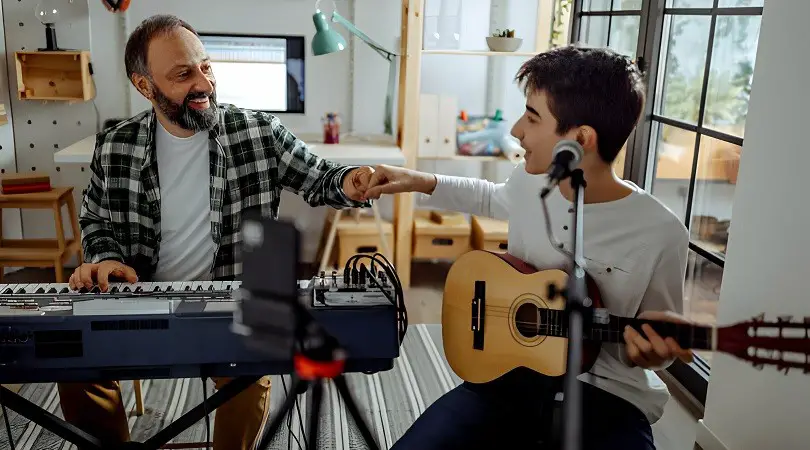Last Updated on January 6, 2025
Introduce your child to musical instruments to spark their curiosity and creativity. This will provide them with a lifelong love of music and an opportunity for personal and intellectual growth.
Musical instruments have the power to captivate children’s imaginations, enhancing their cognitive development and fostering emotional expression. By exposing children to various musical instruments, parents can help cultivate their auditory skills and ability to appreciate different sounds and music genres.
Learning to play an instrument can also boost a child’s confidence and discipline, as they master new skills through practice and dedication. Additionally, music can serve as a medium for children to express their emotions and connect with others, promoting social and emotional development. Therefore, introducing your child to musical instruments can have a profound impact on various aspects of their development and well-being.
Benefits Of Music Education

Introduce your child to musical instruments for an enriching experience. Music education enhances cognitive skills, boosts creativity, and fosters self-expression in children. Encourage their musical journey to unlock the magic of music.
Enhances Cognitive Development
Learning to play musical instruments stimulates various parts of the brain, enhancing cognitive development.
Children engaging in music experience improved memory, attention, and problem-solving skills. Through reading musical notes and understanding rhythm, they develop better language and reasoning abilities.
Improves Academic Performance
- Research shows that music education correlates with enhanced academic performance.
- Students involved in music programs perform better in math, reading, and science.
- Learning an instrument involves discipline and focus, which translates to improved study habits and academic achievement.
- In addition, music education fosters creativity and critical thinking skills, providing a well-rounded academic foundation.
Choosing The Right Instrument
Choosing the right musical instrument for your child is an important decision that can ignite a lifelong passion for music. It’s a process that involves considering your child’s interests and evaluating physical attributes to ensure the right fit. Let’s delve into these aspects and guide you through this exciting journey of introducing your child to the magic of music through the perfect instrument.
Consider Child’s Interest
Understanding your child’s interests is crucial when choosing a musical instrument. Observe what type of music they enjoy and the instruments they are drawn to. If they love the sound of strings, they might gravitate towards a violin or guitar. If they find joy in percussive rhythms, drums or percussion instruments could be a great fit.
- Observe your child’s musical preferences.
- Consider the sound of different instruments and how it aligns with your child’s preferences.
- Engage your child in conversations about various instruments to understand their excitement and curiosity.
Evaluate Physical Attributes
Assessing physical attributes is essential to ensure the chosen instrument is suitable for your child’s capabilities. If your child has small hands, a smaller-sized instrument like a ukulele or flute might be more manageable. For those with a strong lung capacity, wind instruments such as the trumpet or saxophone could be an excellent choice.
- Take note of your child’s physical strengths and limitations.
- Consult with music instructors or professionals to find instruments that align with your child’s physical attributes.
- Ensure the instrument’s size and weight are comfortable for your child to hold and play.
Introduction To Popular Instruments
Immerse your child in the enchanting world of music by introducing them to a variety of popular instruments. Each instrument holds its captivating charm and offers a unique learning experience, fostering a love for music that will last a lifetime.
Piano
The piano is a versatile instrument that allows children to learn music theory and develop dexterity.
Encouraging creativity and expression, the piano is an excellent starter instrument for young musicians.
Violin
The violin is a beautiful string instrument that teaches discipline and precision.
Learning the violin enhances concentration and fosters a deep appreciation for classical music.
Drums
Drums are a dynamic instrument that teaches rhythm and coordination to young musicians.
Playing the drums promotes teamwork, as drummers often collaborate with other musicians in a band.
Creating A Musical Environment At Home

Create a musical haven at home by introducing your child to various musical instruments. Stimulate their creativity, and cognitive development, and foster a love for music in a fun, interactive way. Encourage exploration and experimentation, allowing them to discover the magic of music.
Setting Up a Practice Area
Are you ready to introduce your child to the magical world of music? One of the first steps in creating a musical environment at home is to set up a designated practice area. This will help your child develop a routine and provide a dedicated space for them to explore and play with their instrument. Whether it’s a corner in their bedroom or a separate room altogether, make sure the practice area is free from distractions and has enough space for the instrument and any accompanying materials. A comfortable chair or stool and good lighting are essential for encouraging regular practice sessions.
Playing Music Regularly
Once you have set up the practice area, the next step is to ensure that your child plays music regularly. Consistency is key when it comes to learning any instrument. Encourage your child to practice for short periods every day, rather than long sessions once in a while. Regular practice not only helps your child build a strong foundation in music but also develops discipline and a sense of commitment. Set a specific time each day for practicing, and make it a part of your child’s routine. Consider using a timer or a music practice app to keep track of their practice time and make it more engaging.
To make practicing more fun and enjoyable, try incorporating different techniques and exercises. For example, you can play along with your child or enable them to play along with their favorite songs. This not only enhances their playing skills but also boosts their confidence and motivation. Additionally, encourage your child to experiment with different sounds and melodies, and allow them to express their creativity through improvisation. Remember, the more your child plays and interacts with their instrument, the more proficient they will become.
So, why wait? Dive into the world of music with your child and create an environment that nurtures their musical talents. By setting up a practice area and encouraging regular practice sessions, you are fostering a love for music that will last a lifetime. Embrace the joy and magic of music together with your child, and watch as they thrive and grow in their newfound passion.
Making Learning Fun And Engaging
Introducing your child to musical instruments can be a wonderful and magical experience. However, it’s important to make the learning process fun and engaging for them. By incorporating games and challenges, attending concerts and performances, you can enhance their musical journey while ensuring they have a great time.
Incorporating Games And Challenges
One of the best ways to make learning music fun for your child is by incorporating games and challenges. By turning the learning process into a game, you can motivate them and keep them engaged.
- Create a musical scavenger hunt where your child has to find different instruments and match them to their corresponding sounds.
- Play “Name that tunes” by playing short melodies on different instruments and having your child guess what song it is.
- Organize a friendly competition where they can compete against their siblings or friends in playing their instruments.
Attending Concerts And Performances
Attending concerts and performances can be a great way to introduce your child to the magic of music. Experiencing live music can ignite their passion and inspire them to learn and play an instrument. Look for local community concerts, school performances, or even professional orchestras and bands that offer family-friendly shows.
- Discuss with your child about the upcoming concert and what they might expect to see and hear.
- Make it a special event by dressing up a little and enjoying a nice meal together before the performance.
- Encourage your child to pay attention to the different instruments and musicians on stage, and ask them questions about what they liked most about the performance afterward.
Frequently Asked Questions
What Are The Benefits Of Introducing My Child To Musical Instruments?
Learning to play a musical instrument can boost creativity, enhance cognitive skills, improve coordination, and foster a sense of achievement.
What Is The Right Age To Start Introducing My Child To Musical Instruments?
There is no specific age for introducing your child to musical instruments. However, children are often ready to start around the age of 4 or 5.
How Can I Choose The Right Musical Instrument For My Child?
Consider your child’s interests and preferences, their physical abilities, and the level of commitment required for each instrument before making a decision.
How Can I Encourage My Child To Practice Regularly?
Make practice sessions enjoyable and interactive, set specific goals, provide positive reinforcement, and create a routine that suits your child’s schedule.
Can My Child Learn More Than One Musical Instrument At A Time?
Yes! Learning multiple instruments can broaden your child’s musical skills and provide a well-rounded musical education. However, ensure they have enough time and dedication for each instrument.
Conclusion
Introducing your child to musical instruments can spark creativity and enhance their cognitive skills. Encourage exploration and self-expression through music to nurture their passion. Start this journey with patience and enthusiasm, and watch your child develop a lifelong love for the magic of music.








